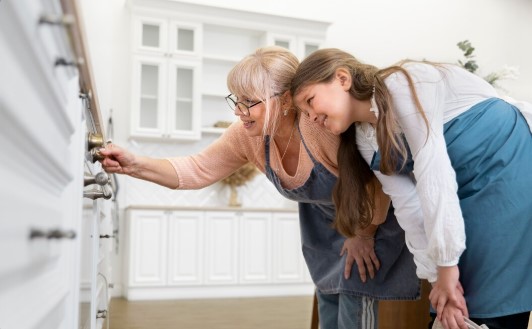How Regular Deep Cleaning Enhances Safety in Aged Care Communities (Business Opportunities - Other Business Ads)

INNetAds > Business Opportunities > Other Business Ads
Item ID 3410518 in Category: Business Opportunities - Other Business Ads
How Regular Deep Cleaning Enhances Safety in Aged Care Communities | |
Why Deep Cleaning Is Essential for Aged Care Deep cleaning plays a crucial role in removing contaminants that accumulate over time. It supports infection prevention, creates safer living spaces, and helps aged care centres maintain compliance with regulatory standards. Key reasons deep cleaning matters: Reduces transmission risk of viruses and bacteria Helps manage odours and biological waste Improves indoor air quality for residents with respiratory issues Extends the lifespan of flooring, carpets, and fixtures Demonstrates a facility’s commitment to safety and professionalism By incorporating a structured approach, aged care settings ensure that cleaning efforts are both effective and sustainable. Deep Cleaning Schedules: Planned, Routine, and Strategic Establishing a clear schedule ensures that every area receives the level of attention it requires. A strategic deep cleaning timetable must consider resident habits, foot traffic, and infection-control priorities. Typical Deep Cleaning Schedule for Aged Care Communities Daily Deep-Touch Tasks Sanitise high-touch points (handrails, lift buttons, mobility aids) Clean shared bathrooms and remove biofilm around taps and tiles Degrease kitchen surfaces and disinfect food preparation zones Weekly Deep Cleaning Steam-clean carpets in high-traffic areas Deep scrub bathroom floors using machine-assisted agitation Disinfect communal lounge furniture and fabric surfaces Monthly or Quarterly Deep Cleaning Full room resets including wall washing and ceiling dust removal Deep extraction carpet cleaning using hot water-based systems Ventilation and air-duct cleaning for improved airflow Mattress sanitation using UV-C or hospital-grade disinfectants These schedules MUST align with seasonal infection trends and regulatory expectations, ensuring facilities stay prepared during high-risk periods such as flu season. Deep Cleaning Equipment Essential for Safety Using the right equipment enhances both cleaning efficiency and resident protection. Modern aged care facilities benefit from tools designed to eliminate pathogens quickly and safely. Common Equipment Used in Aged Care Deep Cleaning HEPA-filtered vacuums — capture fine particles, dust mites, and allergens Steam cleaners — remove grime and kill pathogens without harsh chemicals Electrostatic sprayers — provide uniform disinfectant coverage across surfaces Scrubber-dryers — ensure thorough cleaning of hard floors without leaving residue UV-C sanitation devices — effective for mattresses, medical equipment, and small spaces Hot water extraction machines — deliver deep carpet cleaning and stain removal Advanced equipment reduces manual labour while ensuring every corner is treated with the same consistent hygiene standard. Deep Cleaning Techniques Used in Aged Care Facilities Specialist techniques ensure aged care environments stay hygienic while protecting residents from harmful chemical exposure. Highly Effective Deep Cleaning Methods Steam sanitisation: Uses high-temperature vapour to penetrate fabrics and kill pathogens. Biofilm removal: Targets build-up in showers, sinks, and wet areas where bacteria multiply. Colour-coded cleaning systems: Prevents cross-contamination between sensitive areas. Fogging or misting disinfectants: Ideal for outbreak response and large communal zones. High-pressure cleaning: Restores outdoor paths and improves slip resistance. Touch-point mapping: Ensures the MOST frequently handled surfaces receive priority cleaning. These techniques form a strong defence against infection risks, contributing to a healthier living environment for residents and staff. How Regular Deep Cleaning Enhances Resident Safety Deep cleaning directly contributes to the safety and wellbeing of aged care residents by: Reducing infection transmission through thorough sanitisation Lowering fall risks by maintaining clean, non-slip flooring Preventing mould growth that can affect respiratory health Improving visual appeal, which supports mental wellbeing Creating a comfortable and hygienic living environment When performed regularly, deep cleaning supports long-term safety and compliance, enabling aged care communities to operate with confidence. Conclusion Regular deep cleaning is an essential investment for aged care communities. By implementing structured deep cleaning schedules, using advanced equipment, and adopting specialised techniques, facilities can maintain a safer, healthier, and more hygienic environment. The right approach not only protects residents but also ensures compliance, enhances operational efficiency, and boosts overall quality of care.  | |
| Target State: All States Target City : Adelaide Last Update : 23 November 2025 7:46 AM Number of Views: 49 | Item Owner : Madani Service Pty Ltd. Contact Email: Contact Phone: 0470567892 |
| Friendly reminder: Click here to read some tips. | |
INNetAds > Business Opportunities > Other Business Ads
© 2025 INNetAds.com
USNetAds.com | GetJob.us | CANetAds.com | UKAdsList.com | AUNetAds.com | CNNetAds.com | Hot-Web-Ads.com | USAOnlineClassifieds.com
2025-11-23 (0.527 sec)